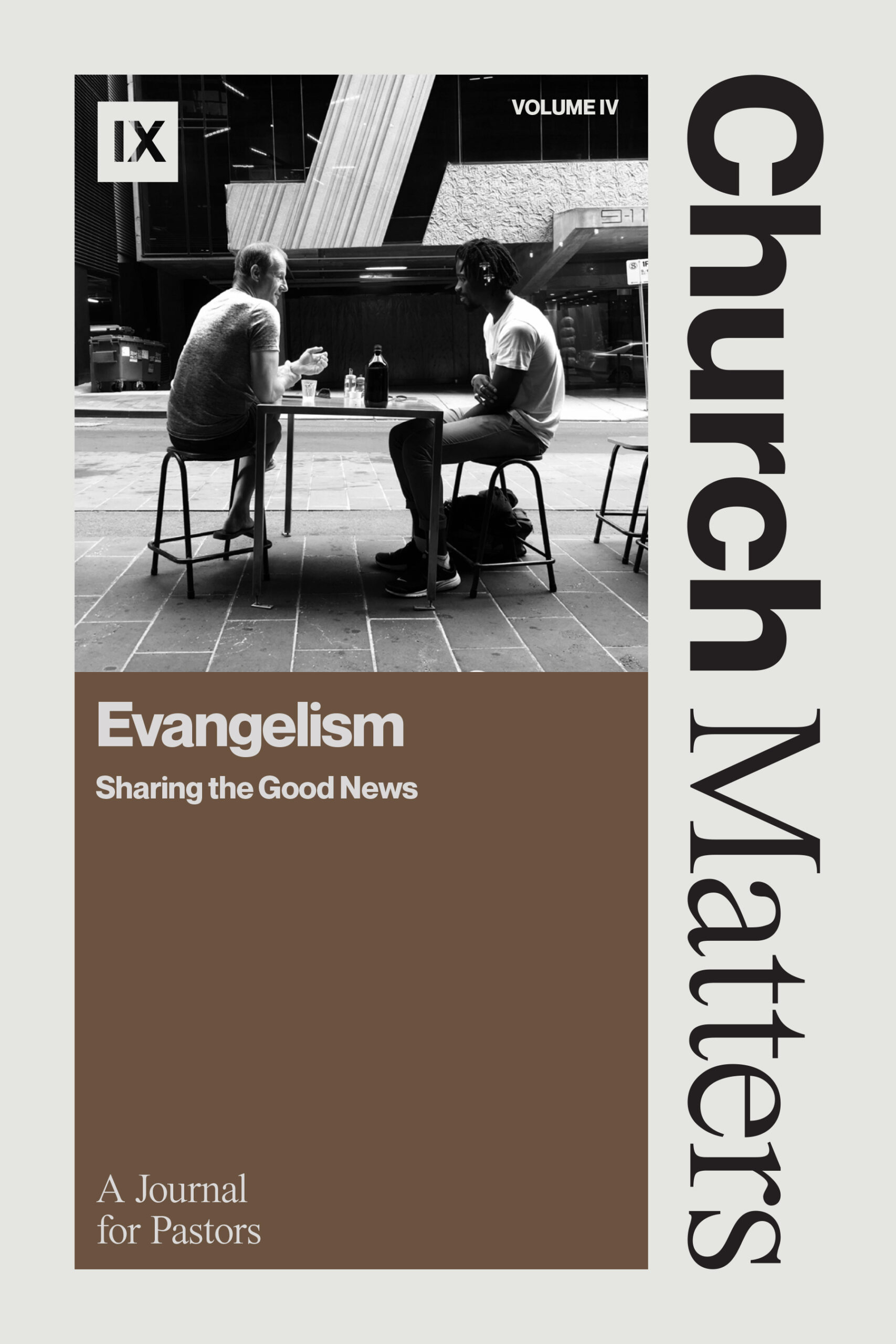Evangelism Without an Altar Call
I preached my first sermon as the pastor of Mount Vernon Baptist Church in Atlanta, Georgia about sixteen years ago. Just before the service began, the minister of music stopped me to ask a question. How would I be making the altar call?
I was confused. There had been no altar calls at MVBC during the three times I had visited as a candidate. I took this to mean the church had long ago decided to abandon the practice.
I was wrong.
It turns out MVBC had a long history of concluding services by appealing to people to walk the aisle in order to join the church, recommit one’s life to the Lord, or make a first-time public profession of faith. The three Sundays I attended were exceptions to the rule. In fact, most members viewed the altar call as a crucial component of the church’s outreach and a significant part of the church’s tradition.
Why Not Give an Altar Call?
Let me start by recognizing that those who give altar calls do so because they sincerely desire for people to be saved. In the early 90s, I attended a church where the pastor ended every service by asking attendees to close their eyes and bow their heads. He would then invite anyone who wanted to receive Christ to raise a hand and look toward the pulpit. For about thirty seconds after this appeal, he would scan the hall, notice every raised hand, and with a calm and quiet voice say, “Yes, brother, I see you. Good, sister, amen,” and so on. He clearly wanted the best for these seekers.
Altar calls remain popular today and are increasingly accompanied by an invitation to be baptized immediately. This practice is referred to as spontaneous baptisms. The SBC’s North American Mission Board even offers instructions on how to organize a “Baptism Sunday.”[1] Their goal is noble: to lead sinners to Christ and grow the church. They insist the practice of spontaneous baptisms is rooted in the New Testament.
Luke does record several baptisms which take place immediately after conversion (e.g., the Ethiopian eunuch in Acts 8). However, this doesn’t necessarily make such practices the prescriptive pattern for the church today. In fact, it seems more likely the apostles baptized new converts quickly in order to mark the spread of Christianity beyond Jerusalem on its way to the end of the earth (Acts 1:8). As the apostles bore witness to God the Son verbally, God the Father bore witness to the gospel supernaturally through “signs and wonders and various miracles and gifts of the Holy Spirit” (Heb. 2:4). Under such unique circumstances, an immediate baptism is quite reasonable. However, with the establishment of Christianity, this practice quickly died out.[2] What followed was the insertion of some length of time between a profession being made and a baptism being performed. This “layover” allowed for churches to consider the credibility of one’s claim to have truly repented and believed on the risen Christ.
In our own era, whether it includes baptism or not, it seems unwise at best and scandalous at worst to assure people of their salvation without taking the time to consider the credibility of their profession.
It is unwise because the church pastor or representative will likely not know the person whose profession he is affirming. Assuring someone of salvation without examining his or her repentance and faith runs the risk of short-circuiting evangelism—i.e., helping someone truly understand what it means to repent, believe, and follow Jesus—in favor of jumping straight into discipling.
Furthermore, granting immediate assurance of salvation can even be scandalous when it replaces the narrow gate designed by our Savior (Mark 8:34; Matt. 7:14) with a wide gate invented by us. Why does Jesus tell us the gate is narrow that leads to eternal life? Because he wants those who would pass through it to be circumspect; they should check their hearts to ensure they understand the cost of following Christ. Someone who refuses to carry his cross is not a Christian, no matter what he professes with his lips (Luke 9:23; Matt. 16:24).
In short, granting assurance of salvation without reliable evidence of repentance runs the risk of undermining the very words of Jesus. Jesus never separated faith and repentance. It is misguided to tell someone thinking about baptism: “If you say you’ve trusted in Christ as your Savior, then you have done all that is needed to go public with that profession through baptism.”[3] No, what’s needed is the opportunity to discern if the profession of faith is credible—that is, is the person trusting in Jesus as is evidenced by their actually following Jesus.
Asking for a profession of faith to be credible is not to ask for maturity, as some claim. It’s to ask for believability, however young, immature, or nascent that faith might be.
John the Baptist warned those who desired baptism not to take it lightly. “Bear fruits in keeping with repentance,” said the prophet (Luke 3:8). With the best of intentions, practitioners of the altar call and spontaneous baptisms have likely given many unsaved persons false confidence they know Jesus. In cultures where the cost of becoming a Christian is relatively low, spontaneous baptisms are especially dangerous.[4]
My point in offering this criticism is not to assert a perfect process for guaranteeing everyone we baptize and welcome into church membership is truly born again. Inevitably, men and women will join our church with wonderful testimonies and signs of grace that, over time, prove to be false. Nonetheless, the fact that some fall away should not lead us to abandon our demand for evidence of repentance. Faithful churches will strive to get to know new believers, hear their story, and ask them questions before affirming their salvation through baptism and church membership.
One more warning: the altar call can put the congregation’s focus in the wrong place. After the Word is preached, members and visitors alike should be examining their own hearts. Everyone should give serious attention to what response he or she must give to the message preached. But the call to walk the aisle or enter the baptismal pool may, ironically, produce the opposite response. Instead of self-examination it leads to audience-examination. People look around. Who’s going to walk forward? I wonder how many will be baptized today? If no one moves, one wonders: Did the pastor fail? Or worse, Did God take the day off?
These are just a few reasons why I think it’s unwise to use the altar call in service of evangelism.
How to Evangelize Without an Altar Call
How should a pastor who rejects the altar call remain evangelistically zealous in a public worship service? Here are seven answers I strive for in the services I lead:
Be Earnest
Though there is nothing more important for a preacher than fidelity to gospel truth, earnestness must be a close second. God uses preachers whose hearts are gripped by the tragedy of sin and the reality of salvation. Until the doctrine of God’s amazing grace has settled in a pastor’s bones, it will never flash from his lips. Paul’s heart for his Jewish brothers is instructive for us: “For I could wish that I myself were accursed and cut off for the sake of my brothers, my kinsmen according to the flesh” (Rom. 9:3). If you preach to others, is it obvious you long for unbelievers to come to know Christ personally?
Be Clear about the Gospel
Every passage of Scripture is a gospel text. In all of Esther, for instance, the name of God is never mentioned, yet his handiwork is on every page. A pastor who wants to see sinners saved will faithfully teach the Bible, showing his congregation how the person and work of Christ is the climax of the whole book.
As we preach the Bible faithfully, gospel doctrine will become more apparent and understood by our congregations. As we examine a certain text, we want to ask ourselves: What does this text say about God? About man? About Christ? Pastor Ben Lacey helpfully encourages preachers to unashamedly preach God’s holiness, man’s sinfulness, Christ’s righteousness, and the necessity of carrying one’s cross. This is a good reminder to every preacher to make the cost of discipleship clear whenever we preach the gospel.[5]
Call People to Repent and Believe
While I may not recommend an end-of-sermon “Come forward!” invitation, our sermons should continually invite sinners to find hope in Christ. So often I hear sermons that call people to stewardship, to risk, to showing mercy—but not once call people to Christ. The preacher should carefully and passionately urge his listeners to repent and believe the good news in submission to King Jesus. I say “carefully” because you don’t want to simply tack an invitation at the end of a sermon in a wooden, mechanical, and dismissive manner (see point one!). That’s not helpful.
What is helpful is understanding that God’s Word demands change. It calls for believers to grow in grace and godliness and for unbelievers to turn and follow our risen King.
God uses the preached Word to save sinners. Just this past year we baptized a newly-married couple. The husband came to faith while hearing the gospel preached from Romans 3 in a Sunday morning sermon. He didn’t walk an aisle, but he did personal business with the Lord. Then he spoke to me later, wrote out his testimony, dug deeper into Scripture, received baptism, and joined the church. We must call people to repent and believe.
Create Space for Follow-up Conversations
When I share the gospel during my sermons, I want unbelievers to know that I’m eager to talk more with them about the faith I’ve just shared. So I make myself available after the service to talk about the gospel and its implications. I regularly state publicly that we want our church to be the kind of place where those who doubt the faith are free to ask questions.
Other pastors I know invite seekers to a special room after the service for prayer or conversation. Pastor Charles Spurgeon gave over every Tuesday afternoon to counsel seekers and new believers.[6] However you decide to do it, provide opportunities for people to talk more personally about what you just preached.
Offer Evangelistic Studies
I commonly let seekers know they are invited to join a short, straightforward study that explains the basics of the Christian faith. The study I use is Christianity Explained, a six-week course through the Gospel of Mark published by the Good Book Company. I’ve found it to be an invaluable introduction to the gospel. In fact, training in how to lead this study has become a staple class at my church.
Make a Big Deal out of Baptisms
Of course, baptisms already are a big deal. Each baptism is an opportunity to show the congregation that God is at work building his church.
At Mount Vernon, we ask each baptismal candidate to share his or her testimony to the congregation. I’ve never required this—it’s a soft expectation—but I’ve yet to have a person turn me down. New Christians are typically eager to testify to God’s grace. Seekers who hear their testimony are challenged to wrestle with the state of their own soul.
Not long ago, we baptized a teenager who had grown up in our church. She had just started college and wanted to go public with her faith. She explained God had saved her through hearing another person’s baptismal testimony. The Spirit used the words (and the courage) of another believer to challenge her to put her own faith in Jesus. Every baptism is an opportunity to encourage believers to remember their own conversion and to challenge unbelievers to take up their cross and follow Christ.
Pray
In the pastoral prayer and even the closing prayer, I regularly plead for sinners to repent and believe the gospel. I pray they would submit their lives to Christ, overcoming whatever obstacles are standing in their way. I pray God would make himself known by drawing them to himself this very day.
Of course, as you can tell, I don’t give an altar call at the church I serve. But I do exhort sinners to flee to a perfect Savior and I pray for God to make it so.
Conclusion
Let us long to see the saints in our congregations encouraged by the gospel and the seekers convinced of their own need to repent and believe God’s good news. Evangelism can be done on Sunday morning, but it ought to be a daily part of every Christian’s life. Each church member should share the gospel naturally, regularly, and with a sense of urgency. Even though corporate worship service is primarily for Christians, let’s call unbelievers to repentance and faith each Sunday.
* * * * *
Editor’s note: This republished article has been revised and updated by its author for this issue of Church Matters.
[1] “Baptism Service Planning Guide,” NAMB. Found at https://www.namb.net/wp-content/uploads/2023/04/2303_N_EL_Baptism-Sunday-Planning_ENG-1.pdf.
[2] See Caleb Morrell, “Does the Book of Acts Teach Spontaneous Baptisms?” 9Marks (3 October 2020). Found at https://www.9marks.org/article/does-the-book-of-acts-teach-spontaneous-baptisms/. Accessed November 18, 2023. See also, Robert H. Stein, “Baptism and Becoming a Christian in the New Testament,” The Southern Baptist Journal of Theology (Spring 1998). Found at https://cdn.sbts.edu/documents/sbjt/sbjt_1998spring2.pdf.
[3] “Baptism Service Planning Guide”
[4] For a detailed treatment of the dangers of the altar call read Erroll Hulse, The Great Invitation: Examining the Use of the Altar Call in Evangelism (Audoban Press, 2006) and D. Martyn Lloyd-Jones, Preaching & Preachers (Zondervan, 2011), chapter 14.
[5] Ben Lacey, “Don’t Walk the Aisle, Carry Your Cross,” 9Marks (14 June 2022). Found at https://www.9marks.org/article/dont-walk-the-aisle-carry-your-cross/. Accessed November 21, 2023.
[6] Arnold Dallimore, Spurgeon: A New Biography (Banner of Truth, 1985), 80.









